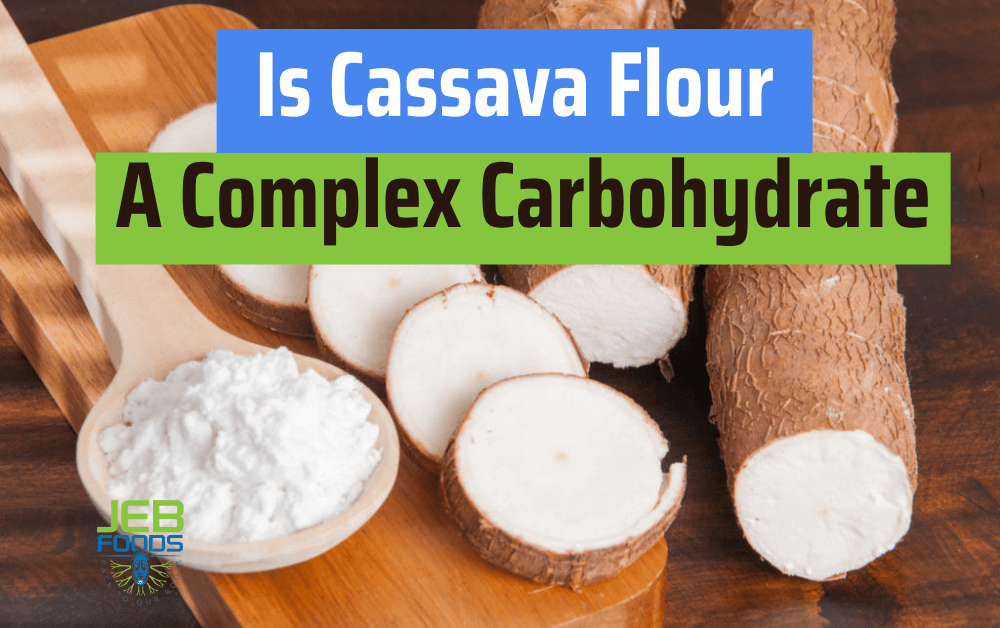To find out if cassava flour is a complex carbohydrate? YES, cassava flour is a complex carb.
Cassava’s most carbohydrates are “complex,” similar to those found in whole grains, legumes, and other starchy vegetables. Complex carbohydrates include longer chains of sugar molecules that take the body longer to digest and use.
The human body uses energy every time, even while napping. Most body energy is required for the resting metabolic rate, necessary for body functions like breathing, heartbeat, metabolic activity, and constant body temperature.
Energy must also be available for physical work: this is where Carbohydrate comes into play. There is a good carbohydrate and what I call a bad carbohydrate (those that breaks down easily)
I will show you in minutes why complex Carbohydrate is essential and healthy for everyone.
But what is the real reason for it? What exactly are carbohydrates? How do they function in the body? And in what foods are they found? I will also show it to you.
Learn all about Cassava flour here
What Is A Carbohydrate
Table of Contents
ToggleCarbohydrates (abbreviated carbs) are macronutrients present in various meals and beverages, including sugars, starches, and fiber.
Additionally, fat and protein are macronutrients. These macronutrients are necessary for your body to be healthy.
Carbohydrates are the most abundant part of food and an essential energy source; they are sugar molecules and energy the brain and muscles.
Kilojoules or kilocalories are the units of energy. Carbohydrates, proteins, and fats are the three macronutrients found in animal and plant-based foods and minerals and vitamins, known as micronutrients.
These macronutrients are broken down in the intestinal tract before being transported to the body cells via the blood and used there.
Carbohydrates As A Source Of Energy
In addition to fat, Carbohydrate plays a significant part in meeting energy needs, though they provide less than half the calories compared to fat.
One gram of Carbohydrate has 4 kilocalories, whereas fat has 9 kilocalories per gram.
Carbohydrates are the principal energy source for muscles and the brain and are transported to all cells via the blood.
Carbohydrates are categorized as single, double, or complex: they are mainly composed of sugar molecules, but that doesn’t mean that all high-carbohydrates tastes sweet.
For example, Bread, Potatoes, Cassava and pasta, for example, contain carbohydrates, as do grains. Many people don’t realize that fruit, due to its sugar, also includes carbohydrates.
Types of Carbohydrates
Carbohydrates are classified into two types:
- Simple Carb
- Complex Carb
Simple carbohydrates include only one or two sugar units and are classified into two types:
- Monosaccharides
- Disaccharides
But in the case of complex carbs, it contains numerous sugar units.
Simple carbohydrates Monosaccharides are the smallest of the carbohydrates since they contain just one sugar molecule. (The prefix “mono-” literally means “one.”) Because of their tiny size and They play a unique function in digestion and metabolism.
Food carbs must be broken down into monosaccharides before they can be absorbed in the gastrointestinal system, and they also circulate in the blood in this form.
There are three types of monosaccharides:
- Glucose
- Fructose
- Galactose
Disaccharides are the second kind of simple Carbohydrate, and they are made up of two sugar units linked together.
There are three types of disaccharides:
- Maltose
- Sucrose
- Lactose
Now let us see the complex Carbohydrates
What Exactly Is A Complex Carbohydrate
This carbohydrate type includes a large number of sugars; complex carbohydrates are also known as polysaccharides. (The prefix “poly-” indicates “many” in Greek.)
Polysaccharides are classified into three types:
- Starch
- Glycogen
- Fiber
All three polysaccharides are made up of numerous glucose molecules linked together, but their structures and types of connections differ.
Complex carbohydrates, or polysaccharides, such as those found in whole grain products, Bread, Cassava, potatoes, or pasta, are more energy-dense.
Polysaccharide-rich foods typically contain high vitamins, minerals, phytochemicals, fiber, and low-fat content.
Root vegetables such as cassava, yams and potatoes, whole grains in bread, oatmeal, whole grain rice, or noodles, fruits, vegetables, and legumes are carbohydrates with their primary sources from polysaccharides and fiber.
You find most complex carbohydrates rich in fiber, especially carbohydrates with low water content.
How Carbohydrates Are Digested
Carbohydrates are broken down in the digestive system into simple sugars, such as glucose, before entering the bloodstream. Insulin is a hormone, helps in transporting glucose from the circulation to the cells of the body.
A particular blood sugar concentration is vital and must not be undercut; otherwise, dangerous hypoglycemia will occur.
When a specific limit value is reached, the liver regulates the breakdown of glycogen and the blood sugar level.
The liver produces glucose during prolonged periods of hunger by breaking down body protein; this ensures that the blood sugar level needed to supply the brain is kept stable.

What Are The Benefits Of Complex Carbohydrates To The Body
Fruits, vegetables, legumes, and whole grains are high in complex carbohydrates. And, because complex carbs are consumed in their complete, unprocessed state, they are a good source of fiber, include vital vitamins and minerals, and have a variety of health advantages.
Here are the benefits of complex Carbohydrate
Maintains Energy
Carbohydrate-derived glucose is the body’s preferred energy source. However, rather than ingesting simple sugars, which create a rapid spike and drop.
It is advised that complex carbohydrates be consumed, burning considerably slower in the system and providing
Weight Control
High-fiber meals provide fewer calories and are more satisfying than low-fiber ones. The combination of low-calorie and satiation may aid in weight reduction and weight maintenance.
Encourages Muscle Growth
Whereas protein is essential for muscle development, carbohydrates are equally crucial for optimizing growth and recovery.
Eating after an exercise restores glycogen reserves and puts the body into an anabolic state, or the process of creating muscle.
Following an exercise, consuming 3 or 4:1 carbohydrates to protein is frequently suggested for best effects.
Blood Sugar Control
Complex carbohydrates’ gradual absorption helps keep blood sugar levels stable and consistent, whereas simple carbs provide rapid energy that may boost blood glucose only to decrease them swiftly.
Promotes Brain Health
Carbohydrates are used as energy by the brain, and a lack of carbohydrates may cause you to feel light-headed and irritated, as well as difficulty concentrating and focusing.
Furthermore, fiber-rich whole grains have been associated with a reduction in cognitive deficits.
In contrast, folate in oats and other whole grains is essential for optimal brain growth and function, thus promoting mental health and wellness.
Complex carbohydrates include antioxidants, vitamins, and minerals that have been found to protect against dementia and Alzheimer’s disease.
Supports Digestive Health
Complex carbohydrate fiber supports bowel health and regularity, owing to “bulk-forming” insoluble fiber sources found in fibrous vegetables, nuts, and fruits with a harder peel.
Fiber-rich diets have also been found to protect against colon disorders, hemorrhoids, and colorectal cancer.
Reduces the risk of death
A recent meta-analysis of over 400,000 individuals discovered that persons who followed high-carbohydrate diets and those who followed low-carbohydrate diets had an increased risk of mortality (death).
Diets containing 50 to 55 percent of total energy from carbohydrates were linked to a decreased risk of death, with the replacement of plant-based proteins for carbs, further lowering mortality risk.
That being stated, rather than drastically reducing or boosting carbohydrate intake, balance the meal plate with lean meats and healthy fat sources.
This is a guaranteed way to ensure the body gets the nutrients it needs while also increasing lifespan.
Check out the nutritional value of cassava flour
Is Cassava Flour Considered A Complex Carbohydrate
Complex carbohydrates, on the other hand, take more time for the body to digest. Blood sugar levels rise more slowly, more evenly, and less dramatically.
Furthermore, complex carbohydrates contain indigestible components known as fiber.
Both ensure that we remain satiated for an extended time; this is beneficial to our health and weight, which is why they are also referred to as good carbohydrates or healthy carbohydrates.
Carbohydrates: Daily Requirement
Carbohydrates should account for 50% of your daily energy intake. But the amount of carbohydrates required for you per day is determined by height, weight, and physical activity.
Men who sit most of the day at work have a daily carbohydrate requirement of around 300 grams, while women with the same activity require around 230 grams.
People with a physically demanding job or who participate in many sports should include more carbohydrates in their diet so that the body can build up enough readily available energy reserves or replenish its carbohydrate stores.
I recommend getting enough nutrients from complex carbohydrates (oligo- and polysaccharides). Ground eggies, whole grains, vegetables, fruits, and legumes are examples of this.
Simple carbohydrates (monosaccharides) found in table sugar, honey, ready-made products, baked goods using gluten-based flour, sweets, and sweet drinks should account for no more than 10% of daily energy intake.
That equates to up to 50 grams of sugar per day, while adults should consume at least 30 grams of fiber per day.
What Happens When You Are Short On Carbohydrates
It is critical to consume enough carbohydrates to perform optimally. However, if you do not meet the recommended value on any given day, you should be concerned.
If carbohydrate deficiency persists for an extended period, symptoms such as the following alarm signals may occur:
- Cravings
- Circulatory issues
- headaches
- fatigue
- indigestion
- bad breath
- difficulty concentrating
- visual disturbances
- loss of athletic performance
These symptoms usually stop as soon as the body receives enough carbohydrates. If the symptoms persist, you should consult your primary care physician.
What Is The Percentage Of Carbohydrate In Cassava
Cassava is a high-carbohydrate food that also contains fiber, vitamins, and minerals. It has 78 grams of total carbs per cup.
The cassava meal receives 312 of its 330 calories, or 95 percent, from carbs, which offer 4 calories per gram. Starches, like those found in cassava, are a kind of complex Carbohydrate.
Based on the US Department of Health and Human Services, they are the most frequent carbs in the average American diet.
Cassava provides 3.7 grams of dietary fiber per serving, or 15% of the recommended intake. Dietary fiber reduces cholesterol and helps control blood sugar.
Dietary fiber is derived from plant foods that your body cannot digest example of such includes vegetables, legumes, fruits, and whole grains. Sweet potatoes contain more fiber with fewer calories than cassava.
Cassava has 42 milligrams of vitamin C, which is 70% of the recommended intake.
Vitamin C as an antioxidant always helps your body absorb iron. It contains 56 milligrams of folate or 14% of the recommended requirement.
Each cup of cassava has 558 milligrams of potassium, which aids with blood pressure regulation. Cassava is low in salt, containing only 29 mg per cup.
Is Cassava Flour High In Carbs
Cassava flour contains a lot of carbs. A cup of cassava flour (285 g) contains around 110 g of carbs, 5 g of fiber, and 4.5 g of sugar. It’s also high in vitamin C, with 1 cup giving nearly 1/2 of the daily requirement.
On a 100-g basis, raw cassava root has more Carbohydrates than potatoes and fewer Carbohydrates than wheat, rice, yellow maize, and sorghum.
The bulk of the carbohydrates in cassava are “complex,” similar to those found in whole grains, legumes, and other starchy vegetables.
Complex carbs possess longer chains of sugar molecules that take longer for the body to break down and utilize.
Final Thoughts
Carbohydrates are found in three different categories of foods and beverages like starches, sugars, and fiber. The term “total carbs” refers to a mixture of all three kinds on the food’s nutritional label.
Carbohydrates – fiber, starches, and sugars — are necessary dietary components that your body converts to glucose to operate properly.
Complex carbohydrate sources such as fruits, vegetables, and whole-grain items are less likely to cause a blood sugar increase than simple carbohydrate sources (sugars).
Low-carbohydrate diets, such as keto, can be rich in fat.




